Astra to perform next launch from Cape Canaveral
Monday, 06 December 2021 14:38
Small launch vehicle developer Astra Space announced Dec. 6 that it will conduct its next launch from a pad at Cape Canaveral in January, carrying a set of cubesats for NASA.
Arianespace expands Galileo constellation to 28 satellites
Monday, 06 December 2021 14:10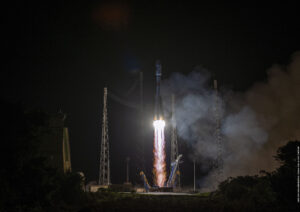
Arianespace successfully launched another two satellites for Europe’s Galileo satellite navigation system Dec. 4, growing the constellation to 28 in orbit.
European space firm to build small, reusable launcher
Monday, 06 December 2021 14:03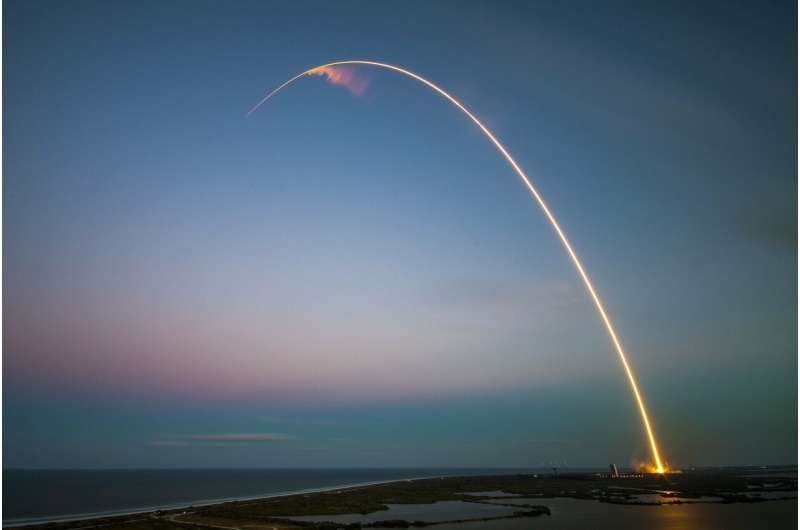
European space firm ArianeGroup will develop a small, reusable carrier rocket to compete with SpaceX, the pioneer of the technology, France's economy minister said Monday.
The launch vehicle should be operational by 2026, Bruno Le Maire said in a visit to ArianeGroup's large rocket testing facility in Vernon, northwest France.
Le Maire admitted that Europe was "behind the curve on reusable launchers".
"We didn't believe in it. We fell behind our American partners who developed Space X and Falcon 9, and we must narrow the gap," he said.
Elon Musk's SpaceX has become a major leader in the sector, with its rockets taking satellites and astronauts into orbit.
Explore further
© 2021 AFP
Webb moved for fuelling
Monday, 06 December 2021 14:00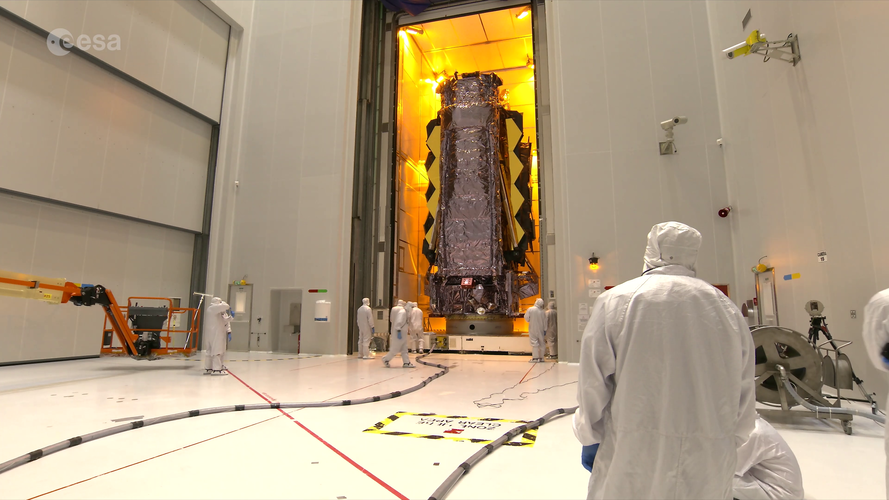 Video:
00:00:51
Video:
00:00:51
The James Webb Space Telescope, configured for flight, was moved from the cleanroom to the payload preparation facility for fuelling at Europe’s Spaceport in French Guiana on 11–12 November 2021.
Webb will be loaded with propellants before being mounted on top of the rocket and then encapsulated by the Ariane 5 fairing.
Webb will be the largest, most powerful telescope ever launched into space. As part of an international collaboration agreement, ESA is providing the telescope’s launch service using the Ariane 5 launch vehicle. Working with partners, ESA was responsible for the development and qualification
South Korea’s Hanwha to expand space business portfolio with rocket development
Monday, 06 December 2021 13:12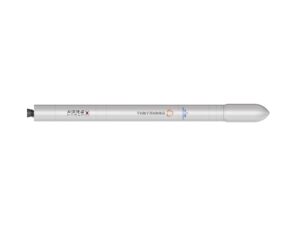
Hanwha Aerospace unveiled the plan Dec. 6, saying it recently held a joint meeting with South Korea's space agency for preliminary requirement review on their envisioned rocket.
Phase Four debuts improved thruster
Monday, 06 December 2021 10:49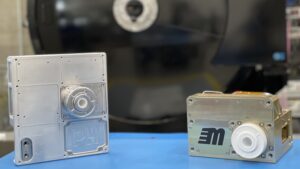
Satellite electric propulsion company Phase Four has completed testing of a new thruster that it says offers significantly improved performance.
ESA spurs 5G digital connectivity
Monday, 06 December 2021 08:14
Efforts to enable seamless connectivity and reduce the digital divide by using telecommunications satellites to enhance terrestrial 5G services have leapt forward.
Yusaku Maezawa: irreverent billionaire fascinated by space
Monday, 06 December 2021 05:42 Japanese billionaire Yusaku Maezawa, who blasts off for the International Space Station this week, is an irreverent space enthusiast who has made headlines for splashing the cash on modern art.
The 46-year-old tycoon is the founder of Japan's largest online fashion mall and is the country's 30th-richest person, according to business magazine Forbes.
But he is far from the traditional ima
Japanese billionaire Yusaku Maezawa, who blasts off for the International Space Station this week, is an irreverent space enthusiast who has made headlines for splashing the cash on modern art.
The 46-year-old tycoon is the founder of Japan's largest online fashion mall and is the country's 30th-richest person, according to business magazine Forbes.
But he is far from the traditional ima Russia to send Japanese tycoon to ISS in return to space tourism
Monday, 06 December 2021 05:42 Russia on Wednesday will send Japanese billionaire Yusaku Maezawa to the International Space Station in a move marking Moscow's return to the now booming space tourism business after a decade-long break.
One of Japan's richest men, Maezawa, 46, will blast off from the Baikonur cosmodrome in Kazakhstan accompanied by his assistant Yozo Hirano.
On Sunday morning, their Soyuz spacecraft wi
Russia on Wednesday will send Japanese billionaire Yusaku Maezawa to the International Space Station in a move marking Moscow's return to the now booming space tourism business after a decade-long break.
One of Japan's richest men, Maezawa, 46, will blast off from the Baikonur cosmodrome in Kazakhstan accompanied by his assistant Yozo Hirano.
On Sunday morning, their Soyuz spacecraft wi U.S. was not blindsided by Russia’s anti-satellite test, say officials
Sunday, 05 December 2021 10:57
"These advances in capabilities are concerning, they are not a surprise," Gen. David Thompson, vice chief of space operations, said Dec. 4 at the Reagan National Defense Forum
Two new satellites mark further enlargement of Galileo
Sunday, 05 December 2021 04:59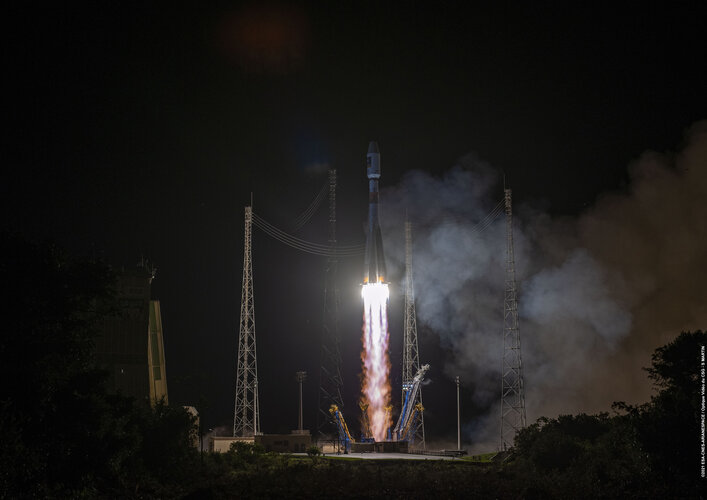
Europe’s largest satellite constellation has grown even bigger, following the launch of two more Galileo navigation satellites by Soyuz launcher from Europe’s Spaceport in French Guiana on 5 December. Galileo satellites 27-28 add to an existing 26-satellite constellation in orbit, providing the world’s most precise satnav positioning to more than 2.3 billion users around the globe.
Ben Griffin explains how Oneweb's LEO Constellation will change the IFC Market
Sunday, 05 December 2021 01:06 Ahead of APEX/IFSA EXPO, APEX Media spoke with Oneweb's VP Mobility Ben Griffin to find out the latest about the company's plans to disrupt commercial aviation's in-flight connectivity market with its low-Earth orbit (LEO) satellite technology.
"We're very well funded, and that's not just random amounts of money coming from strange places," Griffin explained. "It's from companies creating
Ahead of APEX/IFSA EXPO, APEX Media spoke with Oneweb's VP Mobility Ben Griffin to find out the latest about the company's plans to disrupt commercial aviation's in-flight connectivity market with its low-Earth orbit (LEO) satellite technology.
"We're very well funded, and that's not just random amounts of money coming from strange places," Griffin explained. "It's from companies creating Exploring the heart of space weather with the Geospace Dynamics Constellation
Sunday, 05 December 2021 01:06 The Geospace Dynamics Constellation mission - or GDC - is a team of satellites that will study Earth's upper atmosphere and provide the first direct global measurements of our planet's dynamic and complex interface with the space environment. This boundary between Earth's atmosphere and space is called the ionosphere-thermosphere (I-T) system.
This mission will change our understanding of
The Geospace Dynamics Constellation mission - or GDC - is a team of satellites that will study Earth's upper atmosphere and provide the first direct global measurements of our planet's dynamic and complex interface with the space environment. This boundary between Earth's atmosphere and space is called the ionosphere-thermosphere (I-T) system.
This mission will change our understanding of 
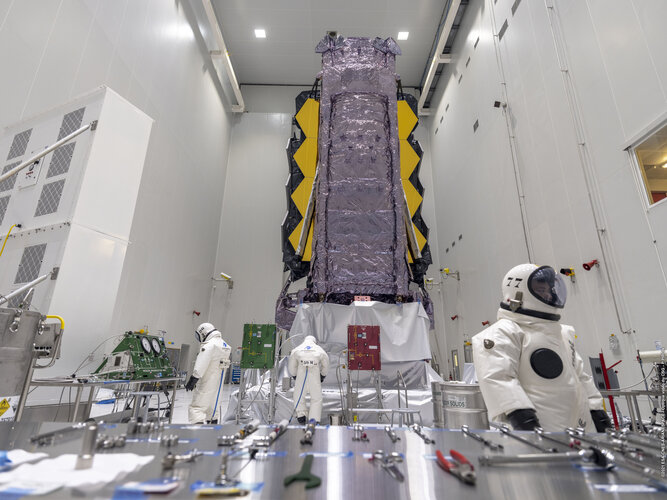 Image:
Webb fuelled for launch
Image:
Webb fuelled for launch